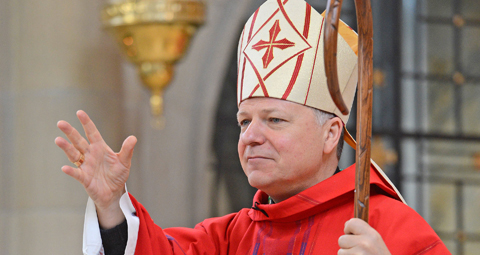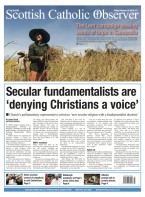BY Daniel Harkins | February 9 | ![]() 0 COMMENTS
0 COMMENTS ![]() print
print

Bishop to meet humanists after criticising ‘anti-religion society’
Bishop John Keenan of Paisley will meet with the Humanist Society Scotland after criticising the group as ‘anti-religion.’
The Bishop of Paisley has agreed to meet the humanist society’s campaigns and communications manager Fraser Sutherland.
In a letter agreeing the meeting, the bishop said he feels ‘routinely in the position of having to defend our Church frankly from what I would say are lazy and quite gratuitous attacks on Catholics in Scotland and their beliefs from members of the HSS.’
“The context of all of this is the general experience of Catholics fairly broadly that the HSS feels some kind of need to ‘take a pop’ at religion in many of its outputs,” he said. “In that sense we naturally conclude that you are as exercised to do away with the place of religion in Scottish civic society as you are to advance the cause of authentic humanism. I, more than anyone, would be very encouraged if the HSS were considering a fairer and more positive appraisal of the contribution of faith communities to Scottish civic society and so open up a new chapter of their due respect for religions in Scotland.”
Mr Sutherland recently criticised the role of religious representatives on local authority education boards.
He called the system ‘outdated, undemocratic and archaic,’ and spoke of bigoted anti-LGBT activists’ on education committees.
Bishop Keenan challenged the humanist society to provide evidence that Church representatives are ‘bigots and anti-science fundamentalists.’
“Our diocesan reps are distinguished former head and depute headteachers, highly respected in our civic and Church society,” he said, asking if the humanists ‘aren’t really a tiny group who exists only in the pages of newspapers?’
“In that sense are they really entitled to lecture on what is or is not real public representation? Have they asked Catholic citizens up and down the country, as well as officials in local government who work well and effectively together with Church reps, if they would prefer their boards to have no input from Catholic schools reps?”
The bishop added: “When you look at the substance of their agenda and output should they really not be called the ‘anti-religion society’ and, would it not be more honest to the general public, and to themselves, to just call themselves that?”
Under the 1973 and 1994 Local Government Acts, most local authority education bodies must appoint a representative from the Church of Scotland, the Catholic Church and a third from a church body or denomination with ‘duly constituted charges or other regularly appointed places of worship.’
Fraser Sutherland said he was ‘disappointed’ with the bishop’s criticism but was looking forward to meeting him and discussing ‘both our views on educational governance and also hopefully give him an opportunity to reflect on his understanding of who humanists are.’
He said his original comments where in reference to a Sunday Herald article on the appointment of a Christian Evangelical to a South Lanarkshire education committee rather than to the Catholic Church.
“Campaigning for a secular state and the removal of privileges in law for certain religious institutions is not ‘anti-religious,”’ he said. “Humanists seek a country, and indeed a world, where all individuals, no matter their faith, belief or none, have their human right to freedom of religion and belief equally respected in the eyes of the law.
“Humanism is also significantly more than just advocating a separation of church and state. It is a legally recognised belief, or as some of our members would refer to an ethical life stance, that has a core set of values based around reason, compassion and community.”











